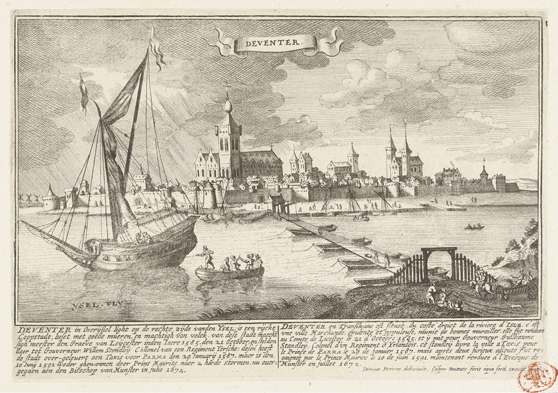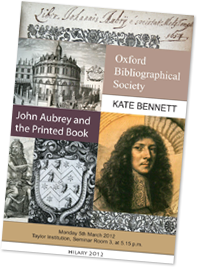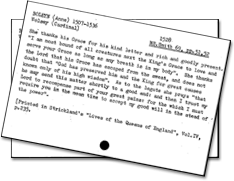* You are viewing the archive for February, 2012
 Much of the seventeenth century was blighted by conflict, and the Thirty Years’ War, which stretched the length and breadth of Europe, affected every aspect of life. The implications for educational institutions and resulting intellectual networks and traditions were wide-ranging, and as such the Bodleian cards refer frequently to the effect of the conflict on universities and those teaching and studying within them. For example, in today’s card – sent on 3 February 1641, when war had been raging for over twenty years – John Christenius (1599-1672) laments the ‘injurious effect’ of the pan-European conflict on ‘the quality of the intake and studies at his university’. The original card compiler speculated that this letter might have been written from Deventer (where Erasmus had been at school a century and a half before, and the economic decline of which was attributed to religious war), and in Dirk van Miert‘s Humanism in an Age of Science: The Amsterdam Athenaeum in the Golden Age, 1632-1704 we read that from 1637 Christenius had indeed held a position at the newly formed Deventer Athenaeum. As students rush their work, emerging ‘unfit for a profession or status’, Christenius suggests to Gerardus Joannes Vossius (1577-1649), professor of history at Amsterdam’s Anthenaeum Illustre, that a teacher capable of inspiring the ‘studiously inclined young men to cultivate their minds towards a more scholarly standard’ be found, recommending the appointment of Hamburg-born Johann Frederick Gronovius (1611-1671). This suggestion met with approval and, following travels in England, France, and Italy, Gronovius was duly appointed professor of rhetoric and history at Deventer, a post he retained until his transfer to Leiden in 1658.
Much of the seventeenth century was blighted by conflict, and the Thirty Years’ War, which stretched the length and breadth of Europe, affected every aspect of life. The implications for educational institutions and resulting intellectual networks and traditions were wide-ranging, and as such the Bodleian cards refer frequently to the effect of the conflict on universities and those teaching and studying within them. For example, in today’s card – sent on 3 February 1641, when war had been raging for over twenty years – John Christenius (1599-1672) laments the ‘injurious effect’ of the pan-European conflict on ‘the quality of the intake and studies at his university’. The original card compiler speculated that this letter might have been written from Deventer (where Erasmus had been at school a century and a half before, and the economic decline of which was attributed to religious war), and in Dirk van Miert‘s Humanism in an Age of Science: The Amsterdam Athenaeum in the Golden Age, 1632-1704 we read that from 1637 Christenius had indeed held a position at the newly formed Deventer Athenaeum. As students rush their work, emerging ‘unfit for a profession or status’, Christenius suggests to Gerardus Joannes Vossius (1577-1649), professor of history at Amsterdam’s Anthenaeum Illustre, that a teacher capable of inspiring the ‘studiously inclined young men to cultivate their minds towards a more scholarly standard’ be found, recommending the appointment of Hamburg-born Johann Frederick Gronovius (1611-1671). This suggestion met with approval and, following travels in England, France, and Italy, Gronovius was duly appointed professor of rhetoric and history at Deventer, a post he retained until his transfer to Leiden in 1658.
According to other EMLO records, Gronovius was no stranger to the city. In 1631 he was writing from there and, by January 1644, the scholarly situation at the Athenaeum appears to have improved to such an extent under the auspices of its new star professor that Vossius praises the ‘great flow of good works from G’s. university and hopes that this will stimulate the senators of G’s. city, renowned for its academic traditions and as the place where Erasmus studied, to provide further for the dissemination of the university’s world-wide fame through monumental works of genius and learning’. Although he encountered problems – see the complications concerning one particular ‘homicidal maniac’ – Gronovius found his lectures ‘well attended’, and it’s a relief to find a productive pedagogical outcome despite (or perhaps even because of) the persistent maelstrom of war.
Miranda is editing metadata from the Bodleian card catalogue of correspondence for our union catalogue, Early Modern Letters Online. On a regular basis, she brings us hand-picked and contextualised records.
Launch Record of the Week
 Our very own Kate Bennett will deliver an Oxford Bibliographical Society lecture on John Aubrey and the Printed Book at the Taylor Institution on Monday 5 March at 5.15pm. John Aubrey is not known primarily for his publications, but for his manuscripts, including his letters, which the Project is editing for publication and calendaring within Early Modern Letters Online. This is often construed negatively, as a failure to print. In her lecture, Kate will reconstruct and explore Aubrey’s complex relationship with printed texts, through his library (full of annotated books), his relations with publishers, his interest in bibliography and the history of the book, and through the libraries of others which he consulted. She will also examine his relationship with the books of those with whom he collaborated, including Anthony Wood and Robert Plot. She will consider how Aubrey balanced print and manuscript as a way of avoiding the risks involved in printing modern histories and lives; and, ultimately what the printed book meant to him. All are welcome!
Our very own Kate Bennett will deliver an Oxford Bibliographical Society lecture on John Aubrey and the Printed Book at the Taylor Institution on Monday 5 March at 5.15pm. John Aubrey is not known primarily for his publications, but for his manuscripts, including his letters, which the Project is editing for publication and calendaring within Early Modern Letters Online. This is often construed negatively, as a failure to print. In her lecture, Kate will reconstruct and explore Aubrey’s complex relationship with printed texts, through his library (full of annotated books), his relations with publishers, his interest in bibliography and the history of the book, and through the libraries of others which he consulted. She will also examine his relationship with the books of those with whom he collaborated, including Anthony Wood and Robert Plot. She will consider how Aubrey balanced print and manuscript as a way of avoiding the risks involved in printing modern histories and lives; and, ultimately what the printed book meant to him. All are welcome!
Following on from November’s workshop, a second installment of Across the Channel: Intellectual Relations between England and France in the Early Modern Period will take place at the Maison Française D’Oxford on Tuesday 28 February 2012. Organised by Martine Pécharman and our very own Philip Beeley, this boutique event will allow five invited scholars to explore Anglo-French exchanges from a variety of perspectives in the context of rich case studies. For the full programme, see the workshop webpage; all are welcome.
Cultures of Knowledge hopes to collaborate on and co-produce a third Across the Channel workshop later in 2012. Watch this space!
 It’s an exciting time for friends and colleagues at Dublin’s Edward Worth Library – a collection of 4,500 books, left to Dr Steevens’ Hospital by Edward Worth (1678-1733), an early eighteenth-century Dublin physician – who have contacted us with two reminders:
It’s an exciting time for friends and colleagues at Dublin’s Edward Worth Library – a collection of 4,500 books, left to Dr Steevens’ Hospital by Edward Worth (1678-1733), an early eighteenth-century Dublin physician – who have contacted us with two reminders:
A conference on The Reception of Newton will be held at the Library on 12–13 July 2012. In recent years, considerable attention has been devoted to the elucidation of the precise nature and scope of Newton’s influence on eighteenth-century science in particular, and on Enlightenment culture more generally. The Library is uniquely positioned to contribute to this ongoing reassessment, as its holdings bear unique witness to the spread of Newtonianism in Ireland. Worth’s collection reminds us of the range and depth of Newton’s intellectual impact on Europe and the crucial role played by second generation Newtonians in clarifying, classifying and re-presenting his ideas. The deadline for 300 word abstracts is 1 March 2012; for further details, see the conference website.
The Library is also offering a single one-month fellowship to be held in 2012, to encourage research relevant to its holdings. The collection is particularly strong in three areas: early modern medicine, early modern history of science, and, given that Worth was a connoisseur book collector interested in fine bindings and rare printing, the history of the book. Research does not, however, have to be restricted to these three key areas. Further information about the collection and its catalogues may be found on the library website. The closing date for applications is 30 March 2012. For further details and application procedures please contact: Dr Elizabethanne Boran, Librarian, The Edward Worth Library, Dr Steevens’ Hospital, Dublin 8, Ireland (elizabethanne.boran[at]hse.ie).

As we thaw out from the February cold snap, for our inaugural Selected Record I thought we should be seasonal and start with our own variant of Old Weather. Using the ‘content’ field in basic search, I entered ‘frost’. My trawl brought up a record for a letter from one John Bennett to the antiquary and diarist Thomas Hearne (1678-1735), an EMLO stalwart responsible for 5,180 records in the catalogue. Bennett, I discovered from thirteen other abstracts in the catalogue, is the son of Sir John Bennett, and in a letter of 14 June 1708 he requests letters to be enclosed ‘to my father Sr. John Bennett, Serjeant att Law, Member of Parliament att his house in Essex Buildings in y e Strand, and then they’l be frank’t at y e Posthouse . . . ’; a quick check in the History of Parliament Online confirms this address. Presumably Bennett junior and Hearne knew each other from Oxford (a quick look in the Alumni Oxonienses confirms they were both at St Edmund Hall). The January in which Bennett wrote to his college friend saw a ‘great frost’ descend across Europe, and this is what he refers to with his tale of snow obstructing streets and unfortunate children meeting their ends in the freezing waters of the Thames. Apparently, the sustained chill was caused by decreased sun spot activity during the Maunder Minimum, which led to the coldest winter for 500 years.
 Alongside the harsh winter, Bennett also mentions a variety of people, places, events, and publications, and we are now in the process of capturing these references systematically across all cards using our catalogue’s powerful online editorial interface, EMLO Edit. The Duke of Marlborough, John Churchill – at the head of his army in the Spanish Netherlands over the winter of 1708/9 and midway between the battles of Oudenaarde and Malplaquet – is mentioned en passant, before Bennett turns his attention to more local matters. He speaks of David Gregory (1659-1708), Savilian professor of astronomy at Oxford from 1691 who had died three months previously, and makes an oblique reference to his successor (a quick search on Wikipedia reveals this to be John Caswell, who held office until his death in 1712). A new professor of poetry is mentioned, and he turns out to be another EMLO correspondent, Joseph Trapp (1679-1747) (the first postholder), and Bennett informs us that Henry Sacheverell (1674-1724) was in London during the cold spell and due to preach at St Paul’s. References to publications by Johan Ernest Grabe (1666-1711), the Königsberg-born divine who settled in Oxford and became a chaplain at Christ Church, and by our very own John Selden (1584-1654) are brought into the letter and, almost as an after-thought, Livy, Tully, and Homer are thrown in. This fascinating network of contexts and connections emerge from a single query regarding inclement weather.
Alongside the harsh winter, Bennett also mentions a variety of people, places, events, and publications, and we are now in the process of capturing these references systematically across all cards using our catalogue’s powerful online editorial interface, EMLO Edit. The Duke of Marlborough, John Churchill – at the head of his army in the Spanish Netherlands over the winter of 1708/9 and midway between the battles of Oudenaarde and Malplaquet – is mentioned en passant, before Bennett turns his attention to more local matters. He speaks of David Gregory (1659-1708), Savilian professor of astronomy at Oxford from 1691 who had died three months previously, and makes an oblique reference to his successor (a quick search on Wikipedia reveals this to be John Caswell, who held office until his death in 1712). A new professor of poetry is mentioned, and he turns out to be another EMLO correspondent, Joseph Trapp (1679-1747) (the first postholder), and Bennett informs us that Henry Sacheverell (1674-1724) was in London during the cold spell and due to preach at St Paul’s. References to publications by Johan Ernest Grabe (1666-1711), the Königsberg-born divine who settled in Oxford and became a chaplain at Christ Church, and by our very own John Selden (1584-1654) are brought into the letter and, almost as an after-thought, Livy, Tully, and Homer are thrown in. This fascinating network of contexts and connections emerge from a single query regarding inclement weather.
Miranda is editing metadata from the Bodleian card catalogue of correspondence for our union catalogue, Early Modern Letters Online. On a regular basis, she brings us hand-picked and contextualised records.
Launch Record of the Week
 Much of the seventeenth century was blighted by conflict, and the Thirty Years’ War, which stretched the length and breadth of Europe, affected every aspect of life. The implications for educational institutions and resulting intellectual networks and traditions were wide-ranging, and as such the Bodleian cards refer frequently to the effect of the conflict on universities and those teaching and studying within them. For example, in today’s card – sent on 3 February 1641, when war had been raging for over twenty years – John Christenius (1599-1672) laments the ‘injurious effect’ of the pan-European conflict on ‘the quality of the intake and studies at his university’. The original card compiler speculated that this letter might have been written from Deventer (where Erasmus had been at school a century and a half before, and the economic decline of which was attributed to religious war), and in Dirk van Miert‘s Humanism in an Age of Science: The Amsterdam Athenaeum in the Golden Age, 1632-1704 we read that from 1637 Christenius had indeed held a position at the newly formed Deventer Athenaeum. As students rush their work, emerging ‘unfit for a profession or status’, Christenius suggests to Gerardus Joannes Vossius (1577-1649), professor of history at Amsterdam’s Anthenaeum Illustre, that a teacher capable of inspiring the ‘studiously inclined young men to cultivate their minds towards a more scholarly standard’ be found, recommending the appointment of Hamburg-born Johann Frederick Gronovius (1611-1671). This suggestion met with approval and, following travels in England, France, and Italy, Gronovius was duly appointed professor of rhetoric and history at Deventer, a post he retained until his transfer to Leiden in 1658.
Much of the seventeenth century was blighted by conflict, and the Thirty Years’ War, which stretched the length and breadth of Europe, affected every aspect of life. The implications for educational institutions and resulting intellectual networks and traditions were wide-ranging, and as such the Bodleian cards refer frequently to the effect of the conflict on universities and those teaching and studying within them. For example, in today’s card – sent on 3 February 1641, when war had been raging for over twenty years – John Christenius (1599-1672) laments the ‘injurious effect’ of the pan-European conflict on ‘the quality of the intake and studies at his university’. The original card compiler speculated that this letter might have been written from Deventer (where Erasmus had been at school a century and a half before, and the economic decline of which was attributed to religious war), and in Dirk van Miert‘s Humanism in an Age of Science: The Amsterdam Athenaeum in the Golden Age, 1632-1704 we read that from 1637 Christenius had indeed held a position at the newly formed Deventer Athenaeum. As students rush their work, emerging ‘unfit for a profession or status’, Christenius suggests to Gerardus Joannes Vossius (1577-1649), professor of history at Amsterdam’s Anthenaeum Illustre, that a teacher capable of inspiring the ‘studiously inclined young men to cultivate their minds towards a more scholarly standard’ be found, recommending the appointment of Hamburg-born Johann Frederick Gronovius (1611-1671). This suggestion met with approval and, following travels in England, France, and Italy, Gronovius was duly appointed professor of rhetoric and history at Deventer, a post he retained until his transfer to Leiden in 1658.Letters in Focus with Miranda Lewis

 Our very own
Our very own  It’s an exciting time for
It’s an exciting time for 
 Alongside the harsh winter, Bennett also mentions a variety of people, places, events, and publications, and we are now in the process of capturing these references systematically across all cards using our catalogue’s powerful online editorial interface,
Alongside the harsh winter, Bennett also mentions a variety of people, places, events, and publications, and we are now in the process of capturing these references systematically across all cards using our catalogue’s powerful online editorial interface, 
 Join
Join 